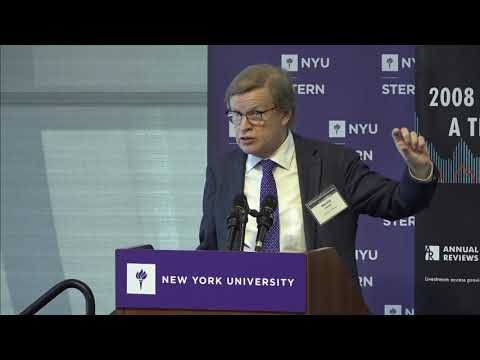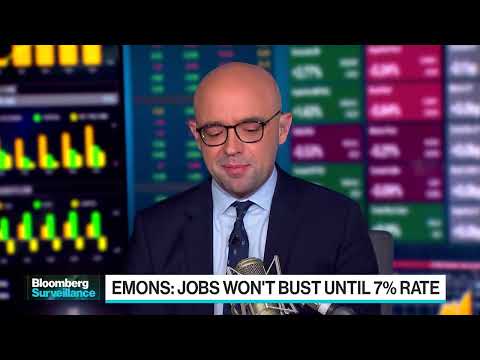2008 Financial Crisis: A Ten-Year Review Conference - Harold James

Thank. You so much Andrew it's, a great pleasure great, honor to be here and to. Talk about one of the articles, in your. 2018. Edition. And. It's. Entitled. D. Globalization. The. Rise of, dis, embedded. Unilateralism. And all, of those words look. Rather complicated, so, I wanted to try, to unpack, those. Words in the. Course of the, morning. What's. Behind it, and. We. Were told that these, should be articles. Review, articles, and I tried to, embrace. A really. Comprehensive literature, on D, globalization. But they should be. Articles. With, we. Were told an attitude. And. The. Attitude, is, more. And more visible. All over. The world. So. At the, recent. Annual meetings of the World, Bank and the International Monetary. Fund and. The. President. Of Indonesia. Joko. Widodo it. Started, off with. A. Slogan. Winter. Is coming. Winter. Is. Coming, and, I. Hadn't. Really been, aware. Of the reference. The range of reference, that, the. President, was making with, that until, a couple, of years ago. It's. A reference and, he went on to elaborate, it it's, a reference to this, very. Popular. Pseudo. Shakespearean. Pseudo. Historical. A little, bit magical, a little bit science fiction, TV. Series called, the game of Thrones and where. Big. Powers. Are. Fighting. For dominance it's, a ruthless. Really. Ruthless world, of, competition. And, destruction. And, it's. A frightening tableau. To mount there for. The annual. Meeting of the International. Monetary Fund I. I. Had. Really. Only started to be. Aware that game of thrones but my students in Princeton, they all watch, Game of Thrones but. I'd only been. Aware of it when. I read. The. Really. Excellent. Blow-by-blow. Micro. History, account of, the, origins. Of brexit. By. The Sunday. Times journalist. Tim, Shipman, and. Shipman. Describes, one. Of the protagonists. One of the key protagonists. Michael. Gove, as. Being, a. Passionate. Fanatic. Follower, of Game. Of Thrones to, the extent that he, plays, apparently. Board, games with his, friends on. Game of Thrones, and. So, I thought I'd better look at this and so I spent a, couple. Of transatlantic flights, viewing, this this, series and what. It is is really a version. Of. Extreme. What's, called realism and political, science and where. There are no permanent alliances. You're. Out, to. Do in the other side it's a zero-sum, game and. The. World, of Game of Thrones is. Describing. A zero-sum. World that, some people thought. Had, come, after. The. Financial. Crisis. And there, was a nice. Book. By, Gideon. Rachman, on. Exactly. That subject, of the. The. Zero-sum. Well. But, the zero-sum world is also, implicitly. A world. Of, D, globalization. So. I thought of that quite. A long time ago in. The early 2000s. When. I wrote a book called the end of global and, it was difficult to explain what what exactly that was. It. Was, fundamentally. A historical. Look at the way in which globalization. As, it has really. Emerged, in the late. 19th century the early 20th century fell. Apart in the interwar era and, the book ended with, a kind of question mark can this kind of D globalization. Be. Repeated. And what, the book. Tried to do and then I tried to follow the structure of this a bit in the article. For the annual, reviews, and the. Book. Looked. At different. Aspects, of globalization. Financial. Flows of course, so. It's, appropriate to have, this discussion here, but.
Also Trade. Flows and migration. Flows and try to show how, they're interdependent how. In some, instances, for instance if migration. Stops, flowing and there's. A buildup. Of population. And then there's a search. For. Products. That can be made and marketed, and so on somewhere else and so trade, openness, is essential, if you don't have the. Open. Borders. For migration, but. Then, there are restrictions, mounting. Pressures for restriction, on that and. Also. Financial. Flows collapse that's the story of the. Interwar. Era, and and. At. That time I ended, with a kind, of question mark on whether. That can. Be repeated. Now. We, know that it can, be repeated, so this is the. From. The. Book. By Bob Woodward on. The. The current. President, and. This. Is one of his speaking notes as a handwritten speaking, note, telling. You that. Trade. Is bad, and there's, obviously behind, this, a. Real. Theory. Of. Attacking. Both. Globalization. And. The. Movement. That he caused globalism. And the people who represented. Who, he calls globalist. So a couple of weeks ago in. Texas you know what a globalist, is a globalist, is a person, that wants the globe, to do well frankly, not caring about our country so much and you know what. We can't have that and. So. That's. Not a. Uncommon. Kind, of sentiment, so there's a pushback, against. Globalization. And. Globalists. You. Know a much more moderate version. Of the same thing was. Given, in the first. Policy, speech, by. The. British prime minister to, resume, in. The mansion house at the end of 2016, the. Forces, of liberalism, and globalization, which have held sway in Britain America and across the Western world for years, have left too, many people behind when. You refuse to accept the globalization, in its current form has left too many people behind you, are not sowing the seeds for its growth but. For its, ruin, so there's, a kind of story. Of. Of. Deep. Globalization. There and it's, a, distinct. Kickback. Against. A world, that was constructed basically. By. At. Least they I think, very prominently, by the two powers, that are in some ways at the moment seeming. To, be. At the front, of the political, movement against, globalism. The. United States and the United Kingdom in the Bretton, Woods conference in. New. Hampshire in, the, summer of 1944. So just as a decisive stage just after the Normandy landings. And. The. Story. There is that. Looking. Back on the. Collapse of. Globalization. In the interwar period the. Makers. Of Bretton Woods, started. With, the perception, that. Both. Prosperity. And. Peace. Were. Inseparable. That, you couldn't have them in just, one country alone and, so that was the theme of the. Opening, address by Henry Morgenthau and it came back at, the end of the Bretton Woods conference peace. And prosperity are. Indivisible. I, think. That's that's widely, known but. I think, it's important, to go, a little. Bit further than that and, to think about the ways in which that. Interconnection. Was. Going to be realized. And the way that it was realized, was, by a whole web, of. Agreements. And some, of those were agreements, by. Treaties, to create. Multilateral. Institutions. Some. Of those were, the acts of, powerful. Countries. To. Get. Trade. Law for instance. Some. Of it was the acts of. Government. Instituted. Regulatory. Authorities. Operating. Internationally, like. ER, IOSCO. Some. Of it was the, act, of entirely, private. Regulations. And, regulators. IOS. So it's it's a kind. Of world in which regulation. Was. Embedded. In. An. International. Network. Domestic. Regulation, was. Embedded, in. Multilateral. Regulation. And international. And supranational. Regulation. And. And, the the. Colombia. Political. Scientist. John. Ruggie has, a term. For that which. He calls, embedded. Liberalism. And it's, embedded liberalism. Which, gave me the kind. Of idea of, what's happening, when embedded. Liberalism. Gets, dis embedded, and into. Unilateralism. And if you like to be cynical about, the, Bretton, Woods Agreement. One. Way of thinking of it at least there, was to think that it was a way of preserving. The. Institutions. And the regulatory, framework that, the New Deal created. In response to the Great Depression and. By. Internationalizing. It by putting it in an international, framework so that's exactly what that, sense of embedded. Liberalism. Means. And. The. The. Story. Then is you. Know pushing. Back against, that so, how, much of that is actually taking place I mean that's obviously a question. And there's a lot of research. On that I tried, to present. Quite, a lot so on, the face of it you. Can think that there may be. Some. Signs of de globalization, in all of the areas that we've, looked. At thought.
About In, in, trade, in. Capital. Flows and migration, flow so with. Capital. Flows. Looking. At the BIS is. Compilation. Of. Cross-border. Claims it. Really does look as if, 2008. Was indeed a turning point and there's a big, fall. After. That and you. Have to be a little bit careful with this I think because, a lot, of this is. A reflection. Of, just what's going on in Europe and. There, clearly is in Europe. A reen, a tional ization of Finance after, the. GFC. The, regulatory recession. And. It's. It's pushed by national, regulators, but. It isn't a global. One and so if you take the European, data out of this you don't see the same kind of effect there's also a. Much. Much more substantial, rise in, foreign. Investment in this period so they the, story of financial. Flows collapsing. Clearly. Isn't completely. Right but we're in a world that at least thinks, about. The possibility. Of D. National ad, globalization. And reen, a tional ization, and. Indeed. I think that. That is, actually. Going. To continue. As a. Kind, of issue and, as, part of the reaction to brexit the European, securities, and markets Authority in Paris is putting, greater claims to regulate, in. In, the European, sphere and that's pushing. Then. A response. In the United States where that seen as an illegitimate interference. In the doctrine, of equivalents. So. We're, not at the end of the, story of. Financial. Deregulation, because. Of the. Reorientation. Of a, regulatory framework, and. The. Trade, area, I think is the area that most people think of when they think about globalization. And D globalization. And, there's. A long. And. Quite. Convincing, story after, the Second World War for a long long period of time that. World trade, is always growing quicker. Than. Industrial. Production, output, GDP. And. That changes, in. The aftermath, of the global financial crisis. World. Trade starts. To grow less rapidly, than. GDP, from, 2013, 2014. But. Again you might say well it's not quite. As simple as, it looks serve. As a push back on. That one, because. For. Instance. There. May be quite, other explanations. For it in particular there's. A technical, explanation. For the technological, explanation. For it and that, is that supply, chains can be shortened. Because, of new. Technologies, of production, you can produce. Nearer, to the market and that's, often, beneficial, because you want to react quickly in some, areas at least to, changes, of fashion changes of demand and so it's important, then to locate your production, and not to have the. Long-distance. Transportation, and, that movement of, on shoring, is. An, important, part. Of the story and so it's on shoring that, may drive some of the trade story without, it being driven by. Protective. Measures, there's a. A. Nice. Survey. That. The. University. Of st. Gallen and, Switzerland. Simon Everett has been doing since. The financial crisis. Of looking, at global trade measures a global trade alert and so, they provide. A. Count, of the. Number of. Measures, that are restrictive. Or discriminatory, and, then counter, the number of measures that are, liberalizing. And basically the. Story is. This. Is updated, to, two today. In. The article. Because. Of the way that articles. Go and it goes to press it stopped, in 2017. And 2017. Was really quite interesting and, it's. A, kind. Of exception, to, this story so you might think that 2016. There's. The election. Of. In. The United States with a o. All. The principle campaigners even. Senator. Clinton. Pushed. Back on some trade agreements, and and. You might think that this is going to prompt. A wave, of. Discriminatory. Trade. Legislation in, 2017. There was more liberalizing. Trade legislation, than, there was discriminatory, trade regulation, but 2018, we. Really look as if we're back in a world of trade wars and that's that's the immediate background, clearly and the big us-china. Conflict, is the immediate background, of. The. Of. The, the. Invocation. Of, the game. Of Thrones. So. Is. That going to be a repetition of, the, world, of the 1930s, are we really going to go into a trade war environment. And. People. Commentators. Politicians. Markets. As well have been just very uncertain, about that and. It's. Difficult to believe that something, as terrible as this is really going to happen and so many people have, the kind of reassuring, belief that. It won't happen or it can't happen that there will be a pullback and so there's, always a search for a little bit of optimism.
So. If you think of what happened on Tuesday. The. Commentators. Wanted. To look in particular at, the. Behavior. The political, behavior of, people. Who were really going to be badly immediately. Affected, by. Trade. Wars and so they looked at soybean, producers, or big producers, and. The, story there is is. Actually it's, not completely, clear again, where, we're headed and the. Republican. Vote in many. Of those areas and so I've been producing areas, that a 13th congressional. District, in Illinois and fell. And. The Democratic, vote rose, but it wasn't enough in 13th, district, which is is quite typical for, a soybean producing. Area it wasn't enough to. Choose a democratic. Victory in that case so. If, there is a sense I think and. III, look, at some of the evidence for this in the in the. Article. That. Trade. Measures, are. Really. Difficult to take. For many people, because. They immediately, cut into welfare so they make iPhones. Or. T-shirts. Or a, whole range of consumer. Items are obviously, more expensive. Washing. Machines, already. Increased, in price so. Madan. Consumer, welfare and. It. May be as a result of that that actually it really is quite difficult to, embark. On a real, trade war rather than on the, threat of a trade war um. The. Area where. I think the pushback is, most likely to, be. Pronounced. Is in, terms, of the discussion, of the third era of globalization in migration. You. See if you look at migration, flows, people. Born outside the country and all the big industrial. Countries in the European Union, and high-income, countries, in the United States you see an increase, very. Very much like the, world, before the First World War, with. Also, a substantial. Substantial. Rise. In, the foreign-born, population that, produces, a backlash. And. If. You like to go back in time this. Is not a new, phenomenon that, took place in the early 20th century a, backlash, against migration, backlash. Taking place today. You. Can see it in earlier. Moments, of kind, of proto globalization. In the sixteenth century. You. Know one recently, discovered. Manuscript. In the handwriting. Of William. Shakespeare, a play. About. The. British. English. Figurative. On the eve of the Reformation, Thomas, More. More. Speech. In. Shakespeare's. Handwriting. Is a denunciation, of. A crowd in London, that, is trying to attack migrants. And push the migrants, from, the Baltic back, to where, they came from and, Shakespeare's. Presentation. Of more, it. Goes against, that so this. Is really, where. The. The, movement is is. Taking. Place. Their. Movement against. Flows, of migration. And, but. I think it's it's. Important. To go back and the, final, section of the paper does, that go, back to the theme, of a. Rejection. Of, the, principle. Of embedded. Liberalism, and the figure who's articulated. This most clearly and is currently. Working. In Europe to try to coordinate.
Anti-eu. Parties. Is. You. Recognize. Him, on the board. Steve, Bannon who predicts, that macro. And macro will fall, down like. Like. Bowling, pins. And. What, it really is I think is a, response. To the, the. Financial. Crisis, a sense that emergency. Measures, are. Needed that, the regulation. Is too complicated, that, it needs to be swept away and, but. Also that. The party. Structure is wrong. And needs to be remoulded. And. That, I think is part of the real, business of the both. The creation, of what. Happens in a globalized, world and the, pushback against, it is it's a political, process and in. The. World. Of globalization as. It was successful, in the late 20th century and. Almost. Every industrial, part a country, had, two political parties two, major political parties, one was a center-right, party one was the center-left party they competed, against, each other, they. The. Center-right. Party couldn't be as hostile, to redistribution, as, it wanted, because. It needed to appeal to the median voter the, center-left party couldn't redistribute. As much as it would maybe some of its followers, would like to because it also needed to appeal to the median voter but. Distribution. Redistribution, took, place in the national context, and. With. Globalization. That starts, to break down so this is something that's already happening, before, the financial crisis, but the financial crisis, intensifies. This. Development. And. There you get parties. On, the. Wings that. Think. We, can. Do. More for our citizens. We can distribute more, if, we, don't have. The International transfers, and. So we want to make finance. National, and. Goods. National, and the, labor market, national. So. That. That. Really, is. Pushing. A meltdown. Of political. Parties the anticipation. Of this, the. The pioneer, on this path was Italy in the. 1990s. But now it's it's happening in in, every, big. Industrial, country the old political, parties you're. Seeing it in countries even that are not, really touched by any kind of direct. Economic problem, in Germany the SPD, and the CDU are really, falling apart. Brexit. Produces. An intolerable. Position, both for the Conservative, Party and for the Labour Party they can't deal with it. So. In. That world this. Call, to. Dis. Embed, your. Regulatory, framework, and. Regulate. Nationally. So. That you are not affected, by cross-border. Spill overs, becomes. More, and more, powerful. M. Before. I conclude I wanted to leave you with. Two. Two. Slides. One. Is a kind, of warning, and this. Is a long story, of. Returns. On safe assets from. A recent paper by, Jordan. And shuriken, Taylor and others and, and the, interesting, thing about it I think you can see is that. In. The aftermath, of big financial crisis, in nineteen seven. 1929. But also 2007. 2008. The. Rate. Of return on safe assets declines. But. You can also see, if you look at the preceding, ones that, their. Anticipations. Of great, power conflict, so it goes before, the first world war this is the pattern before the Second World War and that's the world that Henry Morgenthau was looking at is it absolutely hopeless, well. You. Know the one hope, is I, think there's. A kind. Of iconic figure, from. One of the great European, writers. Johann. Wolfgang von Goethe in goethe's faust, he has a, diabolical. Figure Mephisto, who is, permanently. Trying to do the, negative things, but then, he explains, I'm part, of the Power which eternally. Wills evil, and eternally, works good in, other words the extent of the challenge, to globalization. Can. Produce a. Reforming. And a. Rediscover. Form of the WTO, it may well indeed be pushed by, the degree, of the. Possibility. Of a trade war and so a good, effect might, come out of the risk, of the globalization, that's, why I think it's important, to discuss the globalization, and why do globalization. Is such an issue ten. Years after the financial crisis, thank you. You.
2018-12-24 15:08


